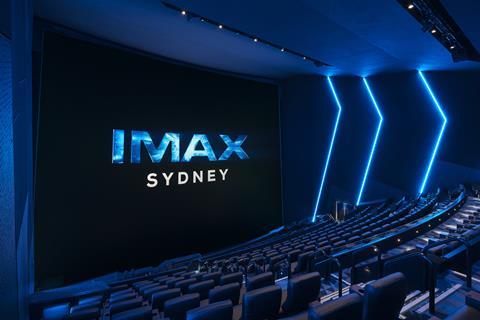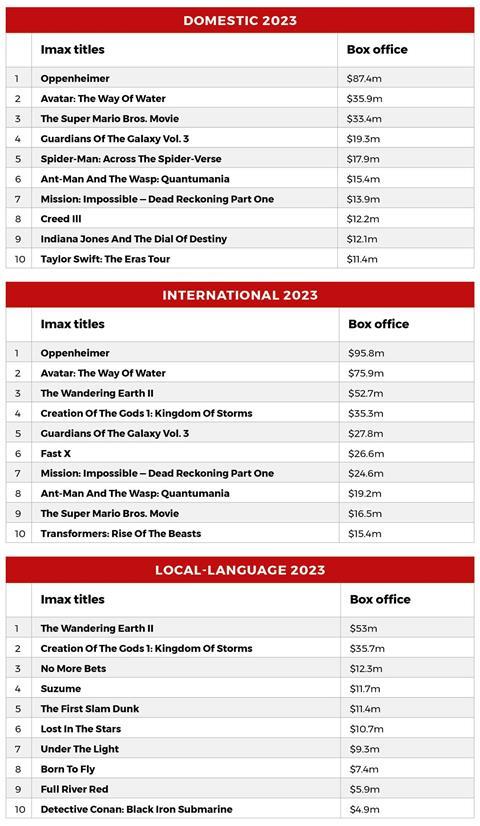
A specialty large-screen format Imax is on a roll, with global box office for 2023 currently on $889m through September, driven by tentpoles such as Christopher Nolan’s Oppenheimer and Frant Gwo’s Chinese sci-fi The Wandering Earth II. It is projected to finish the year close to 2019’s record $1.1bn.
By year’s end, the company will have released 90 films on its global network of 1,651 commercial screens in 87 countries and territories, compared to an annual average of 61 in pre-pandemic times. Q3 earnings just confirmed Imax’s second-highest-grossing quarter of all time at the global box office on $347.1m, up 96% year-on-year, while revenue increased 51% year-on-year to $103.9m.

Current and upcoming releases include two from Apple — Martin Scorsese’s Killers Of The Flower Moon, which recently generated 12% of its North American opening box-
office weekend on Imax screens, and Ridley Scott’s Napoleon in November — as well as The Marvels and The Hunger Games: The Ballad Of Songbirds & Snakes, also in November. Hollywood highlights in 2024 are expected to include Godzilla X Kong: The New Empire, Captain America: Brave New World and Joker: Folie À Deux.
Imax Corporation CEO Rich Gelfond speaks to Screen International about the company’s growth areas, local-language success stories, Oppenheimer, Taylor Swift: The Eras Tour and alternative programming.
What is Imax’s proposition today?
I would say we’re the best way to see a film or experience an event on the planet. It’s not just me or the fans saying this — it’s also the filmmakers like Chris Nolan and Tom Cruise. We capture the artist’s vision and it’s also about the sound and the layout of the theatre.
Oppenheimer was a huge hit for Imax and grossed more than $945m worldwide in all theatres. What has it earned on your global network?
It’s closing in on $185m. We accounted for almost 30% of the US box office, and almost 20% of the worldwide box office — on less than 1% of the screens.
You’ve known Christopher Nolan for a long time and dedicated all your Imax screens to Oppenheimerwhen it opened in the summer. Will all his future films get the same treatment?
We haven’t discussed his next movie, but quite a few have been shot with Imax cameras and he feels it best captures the essence of his work.
What about Barbie?
No, we only played it on a small part of our network in its tenth week [of release]. That was to create an Imax version that Warner Bros will use in its awards campaign, and partially because [director/co-writer] Greta Gerwig loves Imax and wanted to see what it would look like in our format.
Taylor Swift: The Eras Tour generated $13.1m globally on Imax in its opening weekend. How many sites did it play?
Opening weekend was 613 and it will expand onto another 106 screens as additional international markets open in late October, early November.
Where do you see the Imax box office ending on Taylor Swift: The Eras Tour?
I don’t know. Her fanbase is so rabid that the question is, how many times will they keep coming back?
AMC released the film, which was new for the world’s largest exhibitor. Were the terms of your deal different?
Yes, because there wasn’t a studio, it was the Swift family. However, in general terms the economics ended up pretty similar for us.
Renaissance: A Film By Beyoncé comes out on December 1. How many screens will you dedicate to it?
I don’t know yet but on both the Taylor Swift and Beyoncé concert films, we are trying to help get them into Imax in China. It’s too early to confirm that, but we’re trying to make those happen.
What have been your China highlights so far this year?
The Wandering Earth II, which played over Chinese New Year, did $52m this year and the summer release Creation Of The Gods 1: Kingdom Of Storms delivered more than $32m. Chinese New Year’s [box office] this year was a record for us at $61.3m.
How many local-language films will you release this year?
It’s going to be more than 50.
How much have they grossed?
Local-language films are more than $200m this year, which is an Imax record. It’s a big reason why our box office is performing so well as we’re not only playing Hollywood films or local-language films in their [own] territories, but we’re playing local-language films in other territories.
What portion of your entire Imax grosses this year will come from local-language films?
Around 21% as we get close to $1bn. Through the third quarter, 22% of our global box office in 2023 has come from local-language films compared to 12% in 2019.
Which local-language markets excite you?
India and Japan have done extremely well. Japanese anime not only does well in Japan but it exports very well. This year’s The Boy And The Heron and Detective Conan: Black Iron Submarine being a couple of examples.
Do you see a time when annual revenues from all your global screens will be dominated by non-English-language films?
That’s been the trend but it’s too soon to say. I certainly could say local-language films will continue to be a bigger part of our box office.
China remains challenging for some studios to release films. What’s your take on that market?
Because China opened up after the pandemic later than most, it’s been a comeback year but it’s not completely at pre-pandemic levels. That said, we’re doing much better than last year. We’re approaching 2019 levels, although I don’t think we’ll get all the way there this year.

Imax has concluded 120 signings for new and upgraded systems worldwide so far this year, more than double the 47 in 2022. Where are the big growth regions?
I’m very excited about Japan. We have about 50 theatres open there and our per-screen averages are the highest in the world, around $2m, which is about double North America. I’m excited about North America, which had been a slower growth, more saturated region for a while but this year we’ve had a lot of new signings. I’m also excited about the Middle East and Western Europe, including France.
Japan is also a great example of the strength of Imax across a diverse slate. This past weekend [October 20-22], both The Creator and Killers Of The Flower Moon opened simultaneously across the Imax Japan network. The 48 Imax Japan screens represent 28% of The Creator’s nationwide opening weekend box office and 15% of Killers Of The Flower Moon’s Japan opening, despite only playing partial showtime schedules for each title.
How have the strikes impacted your business? Dune: Part Two was pushed from November into March 2024.
The strikes have had only a minimal impact on 2023 and if they’re able to settle soon, it won’t have much of an impact on 2024. If it runs into the new year, it could have a more significant impact on 2024. We’re monitoring the situation and hoping for everyone’s sake that it’s settled soon. The move of Dune: Part Two enables us to play The Marvels [November 10] and The Hunger Games: The Ballad Of Songbirds & Snakes [November 17], and it will significantly strengthen our hand at the global box office for Q1 2024.
Has the Imax portion of a film’s total box office grown?
Our market share in the US is now 50% higher than it was before the pandemic and globally, it’s about 40% better. The pandemic taught consumers that when they go out, they want something special and different from sitting on a couch. That market share growth has provided a lot of momentum and the driver has mostly been per-screen averages going up.
The recent 40th anniversary screening of Jonathan Demme’s Talking Heads concert film Stop Making Sense became the highest-grossing Imax Live event of all time in North America. Do you plan to expand your concert, theatre, and live event offerings?
We do, and we introduced Imax Live about two or three years ago with that in mind. We’ve introduced sporting events like hockey and soccer, and done a number of live concerts. What’s worked well is live Q&As around a film’s release. We did Stop Making Sense with A24 and also The Tragedy Of Macbeth with A24 and Apple. We took Peter Jackson’s Disney+ special The Beatles: Get Back and he re-edited the concert scene and we did a live Q&A session with Peter and did around $3m on the re-release, three months after it came out on Disney+.
It has been a tough few years for exhibition with the pandemic and now the strikes. How do you view the health of your exhibition partners?
I have to start by saying Imax is not an exhibitor, we’re a technology licensing company. So we don’t own any theatres, we don’t have leases, we don’t make money off concessions, and we license our brand and our studio design, and our hardware and our software to exhibitors on a global basis.
Conventional exhibitors have made a lot of progress since the pandemic started to recede, but they have a different model and it’s very capital-intensive — a lot of debt, a lot of leases. I think they’re on the right road, but there are still too many screens out there and they need to decrease their debt load to create a more long-term sustainable model.
























